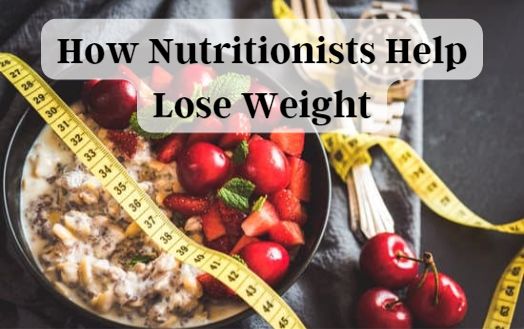Nutritionists are medical professionals who study nutrition. They advise on healthy eating to help people manage chronic conditions like diabetes or obesity. Nutritionists can also help athletes create meal plans for peak performance. They explain how food affects our bodies and minds, from weight management to complex metabolic disorders, as nutrition experts. This article discusses nutritionists and their duties.
Nutritionists must understand biochemistry, physiology, microbiology, public health, and other sciences to assess individual nutritional needs. Nutritionists advise clients based on medical history, lifestyle, and goals. They may also conduct nutrition research or create nutrition education materials.
Finally, nutritionists advise restaurants on menu items for specific clientele groups, such as elderly patrons or those with allergies or dietary restrictions, and collaborate with other healthcare providers on patient care plans involving nutrition. Knowing what it takes to be a nutritionist can help one choose a career. After reading this article, you will know what is a nutritionist and the important role they can contribute to our well-being.
Understanding The Roles Of A Nutritionist
Nutritionists study nutrition and health. They offer nutritional advice and help people reach their health goals through food. Dietitians offer medically-based dietary advice, while nutritionists do not.
Nutrition has long promoted physical and mental health. Good nutrition reduces the risk of chronic diseases like obesity and diabetes and boosts energy and cognition. Nutritionists help clients plan healthy meals with fruits, vegetables, lean proteins, whole grains, and low-fat dairy. They may also discuss portion control and cultural or religious food preferences.
Nutritionists teach cooking techniques and provide recipes for nutrient-dense meals. Personalized support helps people make long-term lifestyle changes that improve nutrition and health. With this knowledge, people can better understand how what they eat affects them physically and mentally, which encourages healthier habits. Understanding nutrition and food consumption habits enhances the quality of life.
Characteristics Of A Nutritionist

Food and nutrition specialists are nutritionists. They understand nutrition science, how food affects health, and how to create individualized nutrition plans for different dietary needs. Nutritionists help people improve their diets and health by counseling, educating, and supporting them.
Nutritionists shape food safety and nutrient intake policies. This includes creating campaigns to encourage healthy eating in certain populations or nutrition-related legislation at local, state, national, or international levels. Everyone should have safe, nutritious food, regardless of socioeconomic status.
Nutritionists conduct medical histories, physical exams, laboratory analyses, and nutrition education to assess patients’ diets. They also create customized meal plans based on the patient’s nutritional needs, allergies, and cultural preferences. When necessary, they work with doctors, nurses, and dietitians.
Qualifications Required In Australia For A Nutritionist
Nutritionists study how food affects humans. They advise clients on healthy eating, assess nutritional needs, plan meals, and teach about healthy foods. Nutritionists need certain credentials.
Nutritionists must have a bachelor’s degree in human nutrition or dietetics from an accredited university. This program should include physiology, biochemistry, anatomy, microbiology, chemistry, and psychology. Many states require nutritionists to pass the Academy of Nutrition and Dietetics (AND) exam in addition to their formal education.
Nutritionists must continue their education to maintain certification. Attending nutrition conferences or workshops or taking online classes from universities or organizations like AND are examples. Some states also require annual continuing education to renew licenses.
These bullet points outline nutritionist certification requirements:
- Have a Bachelor’s in Human Nutrition or Dietetics from an accredited university.
- Pass an Academy of Nutrition and Dietetics exam (AND).
- Attend conferences, workshops, and online classes regularly.
By understanding these important qualifications for entering this field and maintaining proper licensure and certification standards, one can confidently assess if they meet the necessary criteria for ongoing success in this rewarding industry. We can now discuss nutrition’s specialties.
Areas Of Expertise In Nutrition

Nutritionists are food experts. They advise on healthy diets, nutritional status, and lifestyle changes. An accredited practicing dietitian (APD/RD) has completed supervised practice placements, four years of tertiary education in human nutrition science, and a Dietitians Association of Australia , four years of tertiary education in human nutrition science, and a Dietitians Association of Australia (DAA) exam.
Nutritionists specialize in therapeutic, public health, clinical, community-based, and research-based food security strategies. Dietitians assess clients’ needs and design custom diets. In complex cases that require dietary changes, nutritionists may consult with doctors and pharmacists.
Based on evidence-based guidelines for optimal health, they can also advise on food selection and portion sizes. They can also advise clients on practical ways to store their meals safely to avoid bacteria or parasites that could make them sick.
Nutritionists know the nutrients needed for optimal physical functioning, development, and wellbeing throughout life. This includes understanding what foods provide essential vitamins and minerals for growth and maintenance of body tissues; being aware of nutrient deficiencies; providing information about specialized diets; advising appropriate supplementation; promoting behavior change through counseling; evaluating data on food consumption patterns; advocating for improved access to healthy foods among disadvantaged populations; and assessing the
Services Provided By A Nutritionist
Nutritionists are health experts in nutrition science. They offer nutrition services to individuals, families, organizations, and communities. These services can be customized to meet client health needs.
Nutritionists usually ask about diet and lifestyle during initial consultations. This creates a customized nutrition plan. The program may cover meal planning, nutrition topics like food safety and healthy cooking, and physical activity.
Nutritionists may also assess nutritional status using body mass index or biochemical tests, recommend dietary supplements, or create school or hospital menus. Private practice, clinics, and long-term care facilities employ nutritionists.
Nutritionists use nutrition science to help people make healthy changes. When seeking professional nutrition and wellness advice, it’s important to know the difference between a nutritionist and a dietitian.
Difference Between A Nutritionist And Dietitian

Dietitians and nutritionists work in nutrition. Both are food and nutrition experts, but their roles differ. Dietitians focus on medical nutrition therapy and health education and counseling. They may advise athletes and people with diabetes or heart disease to diet. However, nutritionists focus more on general nutrition principles than patient guidance. Nutritionists may research dietetics, create new diets for individuals or groups, or teach dietetics at universities.
Dietitians and nutritionists must complete accredited dietetics or nutrition science programs. Some programs offer dual degrees. Entry-level jobs require a bachelor’s degree; master’s and doctoral degrees can lead to higher-level jobs. Clinical dietetics requires state board licensure. Many professional organizations offer food and nutrition certifications.
Thus, dietitians and nutritionists have distinct careers, but both require extensive training and education. Before deciding to study food and nutrition sciences, one should carefully research their options.
How To Find The Right Nutritionist For You
Choosing a nutritionist is difficult. Research and find someone with experience in health education, community nutrition, and customized nutrition plans. To start, check a nutritionist’s credentials to make sure they can advise on healthy eating and nutrition.
When choosing a professional, consider their specialties and certifications. Some nutritionists focus on weight management, sports nutrition, general wellness, or chronic illness diets. Many professionals offer online education or personalized meal planning to help you reach your goals faster.
Before hiring a nutritionist, ask about their approach. Some professionals base their nutrition plans on research, while others use personal preference. The right fit depends on your needs and the practitioner’s background and beliefs.
No matter how you choose a professional, you must feel comfortable communicating with them so they can understand your unique perspective and tailor solutions to your lifestyle and preferences. After these steps, working with a nutritionist can improve one’s health.
Benefits Of Working With A Professional Nutritionist

Professional nutritionists help people make lasting diet and lifestyle changes. Nutritionists provide personalized, evidence-based nutrition advice. Nutritionists have nutrition education and certification. They can explain how food affects physical, mental, and emotional health and how to use nutrition to treat various health conditions.
Nutritionists advocate for clients by helping them develop healthy, long-term diets. They collaborate with clients to create realistic plans based on personal preferences and lifestyles to achieve health goals through nutritional counseling. A nutritionist can also help you plan meals to meet your nutrient needs while enjoying them.
A registered dietitian or certified nutritionist can help people understand how adding or removing certain foods affects their health. This personalized approach lets people take charge of their health without feeling overwhelmed by conflicting nutrition advice online or elsewhere. When supervised by a scientist, changing eating habits is easier. These benefits clearly explain what is a nutritionist and how they work as professionals.
Creating An Individualized Meal Plan
Many people benefit from working with a professional nutritionist to create a customized plan. Dietitians and nutritionists know food science, human physiology, dietary guidelines, and the health benefits of food. With this expertise, they can give evidence-based diet advice.
Understand that everyone has different nutritional needs based on age, lifestyle, health status, and other factors when creating an individual meal plan. A nutritionist or dietitian will factor these into a meal plan that meets your goals. e.g.
- Your nutritionist may suggest nutrient-rich foods for foetal development if you are pregnant or trying to conceive.
- A dietitian may advise you to cut calories while eating plenty of fruits and vegetables to lose weight.
- Age-related metabolism and digestion changes may require different vitamin and mineral levels in older adults.
Your nutritionist should also take into account any food allergies or intolerances when tailoring your diet. When designing meals, consider cultural differences since traditional diets vary around the world and some cultures emphasize certain ingredients like rice in Asia or corn in Latin America. Finally, if your nutritionist knows what diet works best for you—veganism, vegetarianism, low-carb/keto diets, etc.—they can customize the menu to your preferences while ensuring optimal health.
Getting individualized nutrition advice from a qualified professional is essential to achieving one’s desired body composition and improving overall health through proper nutrition. Understanding portion sizes and carefully reading labels before purchasing prepackaged products are helpful tips for eating healthily. You should also include healthy fats and proteins in each meal to provide sustained energy throughout the day.
Practical Tips For Eating Healthily

Nutritionists advise on diet. They can assist people in developing customized diets based on their unique dietary requirements, lifestyle, objectives, and health conditions. For those looking to change their eating habits as well as those with chronic illnesses or diseases, nutritionists can also offer counseling. Understanding the fundamentals of good nutrition—what foods are nutrient-dense and how they fit into your overall eating plan—is necessary for eating healthfully.
Focus on nutrient-dense foods like fruits, vegetables, whole grains like brown rice and quinoa, lean proteins like fish and poultry, legumes like beans and lentils, nuts and seeds, and low-fat dairy items like yoghurt when making food decisions. These foods contain vital vitamins and minerals that can have a variety of positive effects on your body. By including high-fiber fruits and vegetables in your meals, you can ensure that you are getting the recommended amount of fiber each day.
Along with emphasizing healthier foods, it’s important to avoid processed foods like fast food and prepackaged snacks. These kinds of foods frequently have high calorie counts but few nutrients. When planning your meals, aim for balance by incorporating all the major food groups into your menus at various points during the week so you can get a variety of different nutrients from each food group. Understanding macro- and micronutrients will enable you to maintain proper nutritional balance while still allowing you to occasionally indulge.
Understanding Macro And Micronutrients
Eating healthily involves not only choosing the right foods but also being aware of the nutrients those foods contain and how much of each nutrient a particular person needs to support their particular lifestyle. In order to ensure they are eating a balanced diet that satisfies their nutritional needs, many people have turned to nutritionists and dietitians as valuable resources.
A nutritionist specializes in offering recommendations on healthy eating or dietary practices based on a person’s individual requirements. They can perform a body composition analysis and create meal plans specific to a person’s age, gender, level of activity, medical history, objectives, and other factors. A nutritionist may also review any supplements that a person may be taking and offer advice on safe dosages.
Nutritionists assist people in understanding micronutrients, which are small amounts of essential elements like iron and zinc found in food sources, as well as macronutrients, which include carbohydrates, fats, proteins, minerals, and vitamins. Each nutrient type has distinct advantages that, when combined with healthy eating practices, can enhance bodily function, mental clarity, and wellness in general. A person can also spot dietary deficiencies that might eventually harm their health by being aware of the various types of nutrients that are present in food.
In order to receive individualized advice that is made just for them, it is crucial for people looking to improve their diet or fitness routine to speak with a qualified nutritionist. It is possible to begin making positive changes towards a healthier lifestyle, including monitoring macro- and micronutrient intake, with the help of qualified guidance from a reliable source, such as a nutritionist or dietician. This will serve as a starting point for further investigation into the function of supplements in achieving balance in a person’s daily dietary plan.
The Role Of Supplements In Balanced Diet

Dietitians and nutritionists are medical professionals with specialized training in nutrition and food management. They collaborate with people to help them reach their ideal physical condition. These qualified experts offer their clients advice on how supplements should be used properly as part of a healthy diet. For those who want to get the essential nutrients they might not be getting from their regular diets, supplements can be helpful. They offer necessary vitamins, minerals, amino acids, and other vital nutrients that are present in whole foods but that many people do not obtain sufficient amounts of from their daily diets.
Supplements should never be used as a substitute for real food; rather, they should be used as extra sources of nutrition for people who are unable or unwilling to consume enough fresh produce and other nutritious foods like fish, poultry, and lean meats. For instance, because B12 is not present in plant-based foods, a vegan person may need to supplement his or her daily intake with B12. Similar to this, athletes frequently need more protein than would be provided by a typical diet, so they take whey protein powder after workouts or in between meals. It’s crucial to keep in mind, however, that without appropriate lifestyle habits like exercise and enough sleep, no amount of dietary supplementation has been demonstrated to be effective.
Ultimately, before making any changes based solely on personal research, it’s imperative for all people seeking nutritional guidance—whether it be through eating habits for optimal health or any other goal—to first consult a reliable healthcare professional. A nutritionist or dietitian can evaluate each person’s medical condition and then develop a customized plan based on their unique requirements, taking into account both nutrient-rich foods and, if necessary, supplements.
Eating Habits For Optimal Health
Dietitians and nutritionists are authorities on food and healthy eating. They assist people in comprehending the relationship between nutrition, health, and wellbeing. Through their expertise in clinical nutrition science, they can evaluate a person’s present eating patterns to determine whether any adjustments are necessary to ensure optimal health. For physical health, eating a balanced diet that includes nutrient-dense foods like fruits, vegetables, lean proteins, whole grains, and low-fat dairy products is crucial. Furthermore, it’s critical to consume enough dietary fiber from plant-based foods like nuts and legumes. Consuming healthy fats in moderation—such as those found in avocados and olive oil—will also have a significant positive impact on overall wellbeing.
It is crucial to keep an eye on portion sizes when eating meals throughout the day. Overeating can result in weight gain, which raises the risk of developing chronic diseases like diabetes or heart disease. As a result of their lack of nutritional value, processed foods loaded with artificial ingredients may also lower the risk of developing certain diseases. Water also improves digestion, complexion, and hydration.
Smart food choices are crucial to optimal nutrition and health. Many studies have linked food choices to mental health, making them beneficial both physically and mentally.
Mental Well-being And Food Choices

Food is known to affect mental health. Certain foods may help maintain healthy moods and behaviors. Nutritionists are trained to evaluate how diets affect physical and mental health.
Many studies suggest that certain foods can reduce anxiety and depression symptoms. Omega-3 fatty acids in salmon, mackerel, and sardines protect against cognitive decline and stabilize moods. Some researchers believe that consuming enough essential fatty acids can improve mental health over time. Complex carbohydrates like whole grains also provide serotonin, which regulates sleep and energy.
Nutritionists recommend eating legumes, nuts, and seeds, which aid digestion, boost satiety, and maintain blood sugar levels. Frequent small meals instead of two or three large ones reduce digestive stress and allow the body to absorb more nutrients, improving overall well-being.
According to research and nutritional advice, good-quality foods should be part of any mental health strategy. Regularly eating a variety of nutrient-dense foods can help alleviate psychological distress caused by poor nutrition. We now discuss dietary change methods.
Approaches To Dietary Change
Food and nutrition experts help people change their diets. They usually have an Academy of Nutrition and Dietetics certification and a bachelor’s degree in nutrition. They assess client needs and create customized meal plans, diet changes, nutritional supplements, lifestyle changes, and more.
Nutritionists use several methods to help their clients make lasting dietary changes, including:
- Education: Teaching people about good nutrition can motivate them to eat healthier. Nutritional education covers food labels, portion sizes, and healthy foods.
- Support: Making sustainable dietary changes requires emotional support. Nutritionists let clients discuss their issues without judgement. This fosters client-practitioner trust while also motivating positive behavior change.
- Follow-up Sessions: Scheduling regular follow-up visits enables practitioners to monitor progress and address any areas of difficulty encountered by clients throughout the process. It also provides an opportunity for reassessment if needed, so that adjustments can be made along the way if necessary.
These approaches, when combined, have been shown to effectively help people modify their diets over time while providing important nutrition support when needed.
Final Thoughts On What Is A Nutritionist
Nutritionists play a key role in helping individuals improve their health and well-being. They are qualified professionals who assess an individual’s lifestyle, diet, and nutritional needs and create individualized plans to meet those needs. The cost of a session with a nutritionist varies but may range from $50 to $200 per hour, depending on the type of consultation provided. Nutritionists typically do not diagnose medical conditions; however, they can provide assistance in managing chronic conditions through dietary changes. There are several types of certification available for nutritionists, including registered dietitian (RD), certified diabetes educator (CDE), and licensed dietician/nutritionist (LDN). Nutritionists often offer consultations both in person and online and may accept health insurance as payment for services rendered.
Overall, consulting with a nutritionist is beneficial for anyone looking to make positive changes to their overall wellbeing. For those wanting to take control of their own health care journey, working with a professional nutritionist will help them achieve that goal by providing knowledge about healthy eating habits that can be incorporated into daily life. Additionally, having access to someone knowledgeable about the latest research on food science helps people become more mindful about their choices when it comes to what they eat. With this newfound understanding comes a better appreciation of how food affects one’s physical body and mental state, making it easier than ever before to stay healthy while still enjoying meals. Now you know what is a nutritionist and the importance of working with them to sustain a healthier wellbeing.
FAQs About Nutritionists
How Much Does A Session With A Nutritionist Cost?
The cost of a session with a nutritionist can vary greatly. Generally, the fee for an initial assessment is higher than sessions that follow, and those may be charged at an hourly rate or as part of a package. Factors such as location, the experience level of the nutritionist, and whether additional services are included in the session will determine how much it will cost.
For example, many registered dietitians charge between $50 and $150 per hour, depending on their geographic area and specialization. This cost usually includes any necessary tests or materials that may need to be completed during the session. Some health insurance companies cover some, if not all, of the costs associated with meeting with a Registered Dietitian Nutritionist (RDN). Furthermore, some RDNs offer packages instead of individual appointments, which often include discounts compared to purchasing multiple visits separately.
When selecting a nutritionist to work with, it’s important to consider the type of service you expect from them and select one who meets your needs within your budget range. Making sure to research each practitioner thoroughly before booking your first appointment will help ensure that you receive quality care at an affordable price point.
Are Nutritionists Qualified To Diagnose Medical Conditions?
Nutritionists, sometimes referred to as dietitians, are health professionals who specialize in providing guidance and advice on how to best meet nutritional needs. They assess individual dietary requirements and provide appropriate nutrition plans for a variety of clients, such as athletes or those recovering from illnesses. In some cases, nutritionists may be asked whether they are qualified to diagnose medical conditions.
The answer is yes; with the proper qualifications and experience, a nutritionist can accurately identify medical issues that stem from dietary deficiencies or other causes related to diet and lifestyle. Nutritionists must have extensive knowledge about food composition and digestion processes in addition to understanding the physiological effects of certain foods on the body. Furthermore, many states require that practitioners obtain specific certifications before being able to practice professionally. This certification process ensures that individuals have met the rigorous standards set forth by state boards.
In order to make an accurate diagnosis, nutritionists will observe their patients’ eating habits in detail over time, gather information regarding any current medications or supplements taken, analyze test results if applicable, review family history, ask pertinent questions, pay attention to signs like fatigue or irritability after meals, interact with referring physicians when necessary, carefully consider psychological aspects of eating habits, take into account allergies and intolerances, and draw conclusions based on all gathered data points. With this comprehensive approach, a trained professional should be able to come up with sound recommendations tailored to each individual’s situation so that optimal health can be achieved within reasonable parameters.
Given its complexity and depth, it takes considerable training and experience for a nutritionist to be fully capable of diagnosing medical conditions properly. Those seeking out a competent practitioner should always ensure they check credentials prior to entrusting them with their health concerns.
What Types Of Certification Are Available For Nutritionists?
Nutritionists are trained professionals who help clients achieve their dietary goals and health outcomes. They possess the knowledge, skills, and abilities to provide comprehensive nutrition care services to patients of all ages in a variety of settings. To become a certified nutritionist, individuals must complete certain educational requirements and obtain an applicable certification or license.
Certification programs for nutritionists vary depending on the specific area of practice they pursue. The most common certifications include Registered Dietitian (RD), Certified Nutrition Specialist (CNS), Licensed Dietitian (LD), and Certified Clinical Nutritionist (CCN). Depending on the program chosen, each involves different levels of education and experience in order to qualify for certification.
In addition to these core certifications, there are additional speciality credentials that may be obtained through additional coursework or exams, such as Certified Diabetes Educator (CDE), Board Certified Holistic Nutritionist (BCHN), and Sports Nutrition Certification Program Provider (SNCP). These additional qualifications can increase one’s employability within the field of dietetics by expanding their scope of practice beyond traditional nutrition roles. With proper training and certification, nutritionists can work with medical providers, researchers, educators, and other professionals in various areas related to food science, nutritional sciences, and public health.
Do Nutritionists Provide In-Person Or Online Consultations?
Nutritionists provide services for individuals looking to improve their eating habits. They work with clients to create personalized meal plans and lifestyle changes, often providing in-person or online consultations. Here are some key points to consider when exploring this profession:
- Nutritionists assess a person’s individual needs and develop a nutritional plan tailored specifically to them.
- They monitor progress and make adjustments as needed, helping clients stay on track towards their goals.
- Nutritionists also provide educational materials such as handouts, videos, webinars, podcasts, etc., giving the client the knowledge they need to make informed food choices.
- Many nutritionists offer virtual consultations so that clients can access support from a distance without having to travel.
Becoming certified as a nutritionist requires specialized training. Depending on where you live and what type of certification is available in your area, these may include courses related to dietetics and nutrition science followed by an examination process. In addition, nutritionists must have extensive knowledge of anatomy and physiology and be familiar with current trends within the field of dietary studies. With this information at hand, they can then advise individuals on how to best achieve healthy eating habits through specific diets or exercise regimens.
These professionals help educate people on making healthier choices in relation to food intake. Through various forms of communication, whether it be in-person meetings or remote consultation sessions over video call platforms like Skype or Zoom, nutritionists share essential guidance regarding proper nutrition practices, which can ultimately lead to long-term health benefits for those who seek out their counsel. Additionally, many times they will connect patients with other healthcare providers if any additional medical attention is necessary given the circumstances of each particular case at hand.
Are Nutritionists Covered By Health Insurance?
This question is asked a lot, “Are nutritionists covered by health insurance?”, is an important question for those considering the services of a nutritionist. Generally speaking, most private health insurance plans do not cover nutritional counseling with a registered dietitian or qualified nutritionist. However, there are certain exceptions to this rule depending on the individual’s situation and the type of coverage they have. For example, some Medicare Advantage Plans may provide coverage for nutritional counseling if it is deemed medically necessary due to a specific medical condition such as diabetes or high blood pressure. Additionally, some employers offer supplemental policies that include coverage for nutritional counseling in order to improve employee wellness and productivity.
In cases where health insurance does not cover nutritional counseling, individuals can still pursue these services through out-of-pocket payments or other means, such as flexible spending accounts (FSA). It is also possible to look into special financing options available from providers who specialize in providing care outside of traditional insurance networks. This can be beneficial when dealing with the high out-of-pocket expenses associated with seeing a nutritionist.
When making decisions regarding whether or not to seek professional dietary guidance, understanding what is covered under one’s health plan should be taken into consideration, along with any additional costs associated with seeking help from a nutritionist outside the scope of traditional coverage plans. Depending on the type of policy and healthcare provider network contracted, there are many ways individuals can access professional nutritional advice, either directly from their primary care physician or through referrals provided by their insurer.




